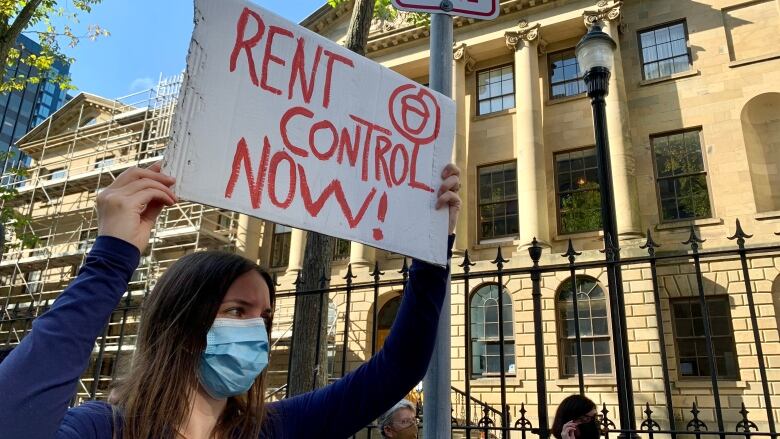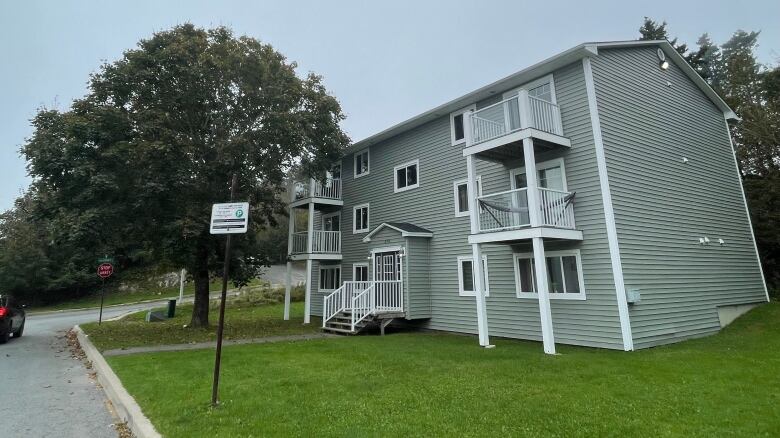Key New Brunswick tenant protection policy dealt a setback in court decision
Mandatory phase-in of large rent increases for tenants not supported by legislation, judge rules

A pair of investors from Coquitlam, B.C., who bought a Saint John apartment building in 2022 and financed the purchase with a largevariable-rate mortgage, are having some success challenging a provincialgovernment rent control policy that spared two of their tenants from rent increases above 20 per cent earlier this year.
The court challenge is aimed at undermining the provincial government's policy of phasing-in large rent increases over multiple years. That policy is the key piece of rent control protection currently offered to tenants by the New Brunswick government.
Karen Sharp owns Leading Edge Property Solutions in Saint John and manages the six-unit building on Saint John's Tartan Street for the B.C. investors.
She delivered rent increase notices to tenants in all six apartments in September 2022 that were to take effect in March. She then went to court in April after two renters, who were being asked to pay an extra $200 per month, filed objections and won the right to have those amounts implemented over three years.

Sharp says the building owners supported the court action, which remains unresolved. However, Sharp did win a key ruling in the case back in May.
"It's been six months now and my legal fees are over $3,000," said Sharp.
"There's no consistency, that's my problem.It just depends on the officer that you get."
Propertyrecords show the apartment building in themiddle of the case sold to B.C. residents Ying Li and Huazhen Qinin March 2022 for $750,000.It was more than double its assessed value for taxes by Service New Brunswick at the time.
The same records confirm it was financed with a $487,500 floating rate mortgage.
Court documents submitted by Sharp show the interest rate on the mortgage, which was set at oneper cent below the Royal Bank'sprime lending rate, started out at 1.45 per cent in early 2022.However, by the end of December 2022it had ballooned to 5.45 per cent.

The escalation was enough to add $1,600 per month in interest to a mortgage of that size.
In September 2022, Sharp delivered rent increase notices to all six apartments in the building for March 2023,citing "increased costs."
Two of the six tenants who had been paying $860 and $900 per month in rent prior to the increase filed for a review with the former Residential Tenancies Tribunal, now Tenant and Landlord Relations Office,and won a partial victory.
The officer handling the case concluded the increases were "reasonable" given current market rentsbut determined because oftheir size they should be implementedgradually in three instalments of $67, citing a new 2023 provincial rent control rule that allows for that.
"Although I find the Notice to be reasonable I order the increase in rent to be spread over three years," the officer wrote in the two cases.No other increases are allowed during the three-year period.
The order was consistentwith public statements made by Jill Green, the minister responsible for housing, who created the phase-in rule.

Last spring, Green said it was government policy that in 2023 every rent increase approved for a tenant in New Brunswick that exceeded the 2022 inflation rate of 7.3 per centhad to be phased-in over two years, or, if it was above 14.6 per cent, over three years without exception.
"There aren't any exceptions built into the rules around the rent increases," said Green.
But in reviewing the decision to phase-in rents at the Tartan Street apartments, Court of King's Bench Justice Kathryn Gregory ruled the legislation Green's department wrote to authorize the policy specifically does allow for exceptions.
Gregory said that meant tenancy officers haveto provide reasons if they decide to order a large increase to be broken up.
"Both decisions appear to suggest, or arguably imply, that the RTT[Residential Tenancies Tribunal] concluded it was mandatory to spread the increase over three years and not discretionary, as is the law," wrote Justice Gregory.
"While there is certainly authority to spread a reasonable rent increase over several years, the RTTdoes not provide any explanation for having exercised the discretion to do so."
In her decision, Gregory ordered the two rent increases to be reviewed again from scratch.
A "new decision," she said, shouldbe rendered"providing reasons sufficient to justify any decision to spread the rent increase over several years and to demonstrate the rationale applied in weighing the relevant evidence."
That order was made on May 29th but as of Thursday this week, 129 days later,Sharp said she had still not received a new decision with reasons, as ordered by Gregory.
But she said she considers the ruling an important victory that upends government claims that tenants have an automatic right of protection from a large rent increase.
"It's not a mandatory thing," she said.
Asked in an email Thursday about Justice Gregory's order,a spokesperson for the Tenant and Landlord Relations Office wrote back saying, "we will check," buthas not yetresponded further.












_(720p).jpg)


 OFFICIAL HD MUSIC VIDEO.jpg)
.jpg)



























































































